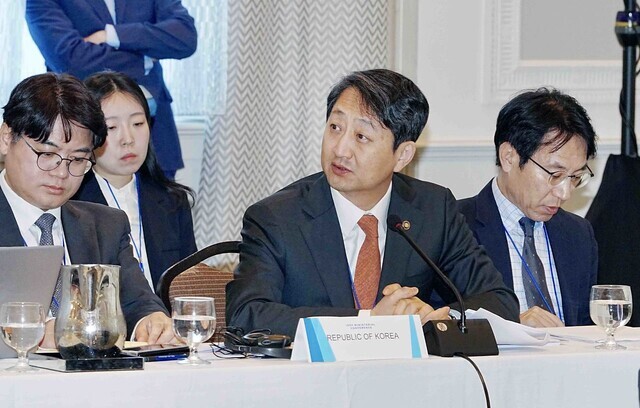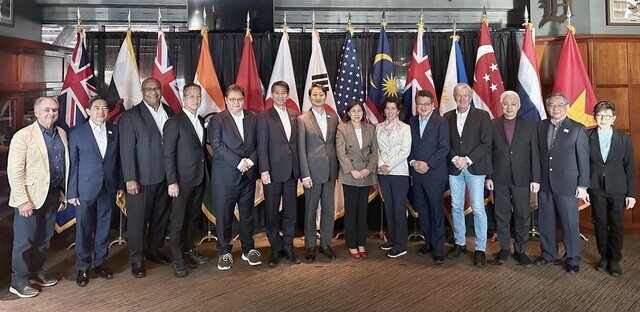hankyoreh
Links to other country sites 다른 나라 사이트 링크
Can the IPEF deliver the US dream of an Asian economy without China?

The participants in the US-led Indo-Pacific Economic Framework for Prosperity (IPEF), a multilateral economic partnership, have signed an agreement on supply chain cooperation. With this development, the US plan to establish an economic order in the Asia-Pacific region that excludes China is fast becoming a reality.
The 14 partners in the framework, which include South Korea, announced the supply chain agreement in a joint press statement released after a trade ministers’ meeting in Detroit, Michigan, in the US on Saturday (local time).
It is the first agreement between the countries participating in the IPEF, which was launched in May 2022, and the first international agreement regarding supply chains.
According to the agreement, the participating countries will establish a “Supply Chain Crisis Response Network” for IPEF partners to facilitate information-sharing and collaboration, such as identifying alternative supply sources, developing alternative transportation routes, and expediting customs clearance.
They will also refrain from taking measures that negatively affect the supply chain of participating countries, and will consult with participating countries when such measures are unavoidable. A council on supply chains will also be established to monitor the implementation of the agreement.
The US Department of Commerce has evaluated that completing negotiations on the IPEF supply chain agreement is a “major achievement” in support of President Joe Biden’s Indo-Pacific Strategy.

South Korea’s Ministry of Trade, Industry, and Energy (MOTIE) called the agreement “significant because it brings together resource-rich and technology-leading countries to build a complementary cooperation system,” adding, “For businesses, it is expected to reduce supply chain uncertainties and improve investment conditions.”
The agreement will be finalized after the participating countries agree on the final text of the agreement through their respective domestic processes and legal reviews.
The IPEF was officially launched in May 2022 at the initiative of the US. In addition to Korea, participants include the US, Japan, Australia, India, Thailand, Malaysia, Indonesia, Vietnam, the Philippines, Singapore, Brunei, New Zealand and Fiji.
With China expanding its influence in the Asia-Pacific region by leading the world’s largest free trade agreement, the Regional Comprehensive Economic Partnership (RCEP), the US created the IPEF to keep China in check. Before the IPEF’s inception, the US had no multilateral economic agreements in the Asia-Pacific region.
The supply chain agreement is expected to ratchet up the pressure the US is exerting on China in an effort to curb its influence.
“The idea is to create a framework to cooperate with each other in the event of a crisis,” said Yasutoshi Nishimura, Japan’s minister of economy, trade and industry. “It is very significant to create a strong supply chain that includes India and Indonesia, which are representatives of the ‘Global South.’”
The countries that participate in the IPEF account for 41% of the world’s gross domestic product, a larger share than the RCEP (30.8%). China has criticized the framework as a geopolitical economic framework aimed at undermining cooperation between China and regional countries.
However, how exactly China will be excluded is not explicitly stated. There is no language — for example, “decoupling” — in the agreement that specifically targets China.
Experts say it is a “loose agreement” that aims to strengthen joint efforts among participating countries to respond to the supply chain crisis. A senior MOTIE official told the Hankyoreh, “There’s nothing that China can object to. It is not aimed at excluding certain countries.”
IPEF participants have been negotiating since September 2022 in four areas: trade, supply chain, clean economy and fair economy, with the first agreement now being reached on supply chains. Negotiations in three of these areas will continue, with the US having set a timetable to conclude the remaining negotiations by the end of this year.
“Southeast Asian countries that are highly dependent on the Chinese economy are in a position to benefit from the negotiations, but they do not appear to have accepted the new economic order led by the US,” said Lee Jae-hyon, the director of the Center for ASEAN and Oceania Studies at the Asan Institute for Policy Studies, insinuating that it will be difficult to move forward with a high-level containment agreement directed at China.
By Kim Hoe-seung, senior staff writer; Kim So-youn, Tokyo correspondent
Please direct questions or comments to [english@hani.co.kr]

Editorial・opinion
![[Editorial] Penalties for airing allegations against Korea’s first lady endanger free press [Editorial] Penalties for airing allegations against Korea’s first lady endanger free press](https://flexible.img.hani.co.kr/flexible/normal/500/300/imgdb/original/2024/0502/1817146398095106.jpg) [Editorial] Penalties for airing allegations against Korea’s first lady endanger free press
[Editorial] Penalties for airing allegations against Korea’s first lady endanger free press![[Editorial] Yoon must halt procurement of SM-3 interceptor missiles [Editorial] Yoon must halt procurement of SM-3 interceptor missiles](https://flexible.img.hani.co.kr/flexible/normal/500/300/imgdb/child/2024/0501/17145495551605_1717145495195344.jpg) [Editorial] Yoon must halt procurement of SM-3 interceptor missiles
[Editorial] Yoon must halt procurement of SM-3 interceptor missiles- [Guest essay] Maybe Korea’s rapid population decline is an opportunity, not a crisis
- [Column] Can Yoon steer diplomacy with Russia, China back on track?
- [Column] Season 2 of special prosecutor probe may be coming to Korea soon
- [Column] Park Geun-hye déjà vu in Yoon Suk-yeol
- [Editorial] New weight of N. Korea’s nuclear threats makes dialogue all the more urgent
- [Guest essay] The real reason Korea’s new right wants to dub Rhee a founding father
- [Column] ‘Choson’: Is it time we start referring to N. Korea in its own terms?
- [Editorial] Japan’s rewriting of history with Korea has gone too far
Most viewed articles
- 160% of young Koreans see no need to have kids after marriage
- 2Presidential office warns of veto in response to opposition passing special counsel probe act
- 3Hybe-Ador dispute shines light on pervasive issues behind K-pop’s tidy facade
- 4Months and months of overdue wages are pushing migrant workers in Korea into debt
- 5[Editorial] Penalties for airing allegations against Korea’s first lady endanger free press
- 6Japan says it’s not pressuring Naver to sell Line, but Korean insiders say otherwise
- 7OECD upgrades Korea’s growth forecast from 2.2% to 2.6%
- 8Bills for Itaewon crush inquiry, special counsel probe into Marine’s death pass National Assembly
- 9[Guest essay] Maybe Korea’s rapid population decline is an opportunity, not a crisis
- 10[Reporter’s notebook] In Min’s world, she’s the artist — and NewJeans is her art